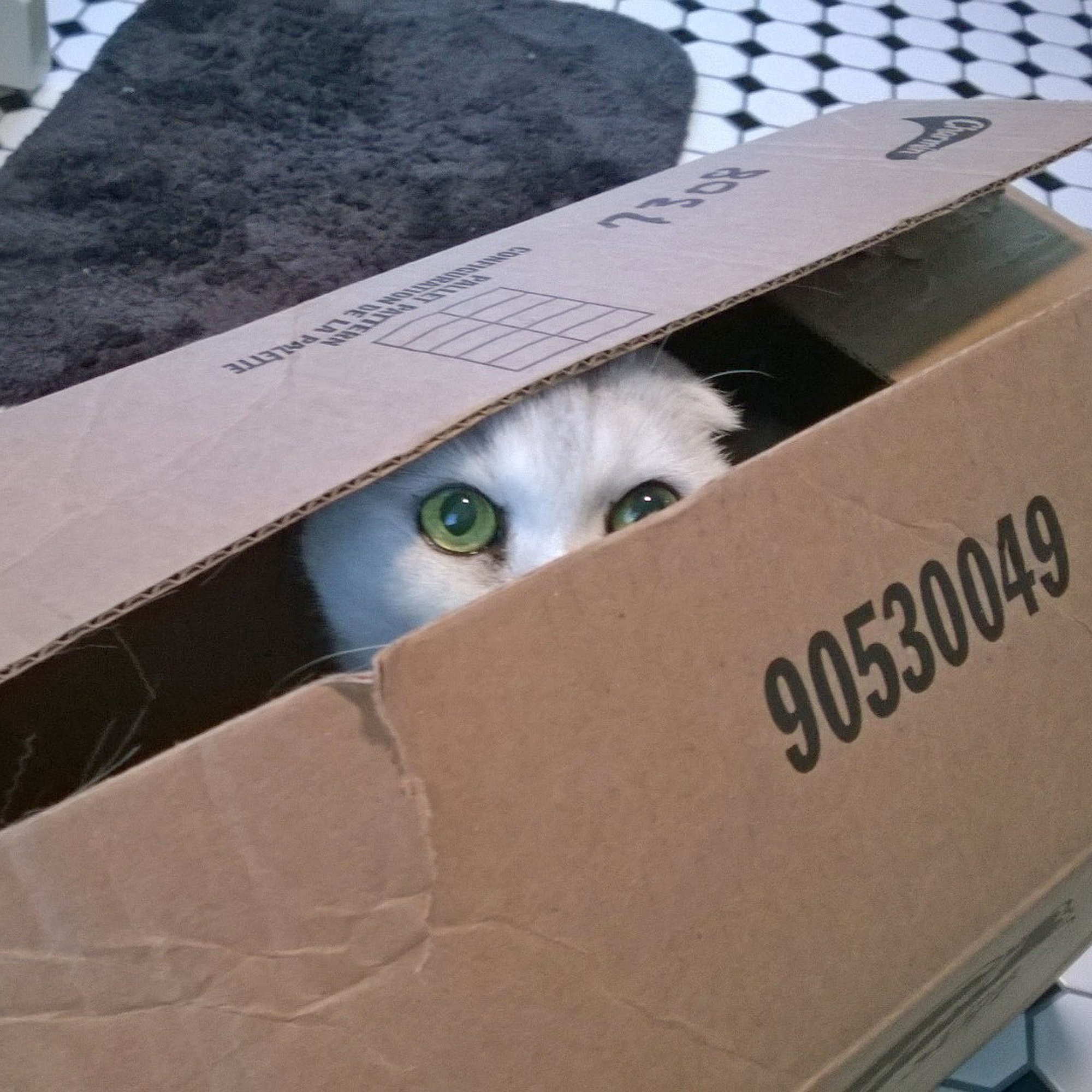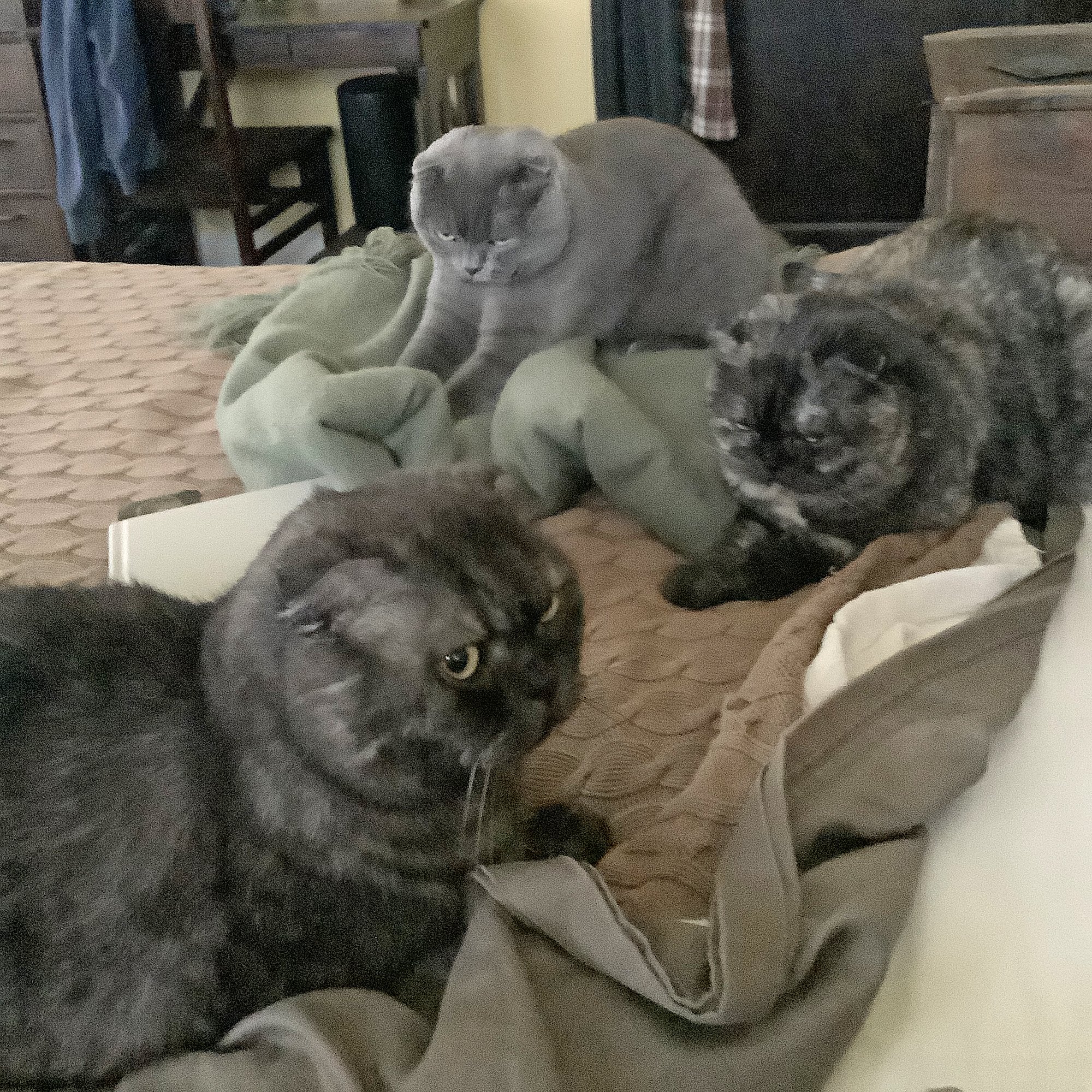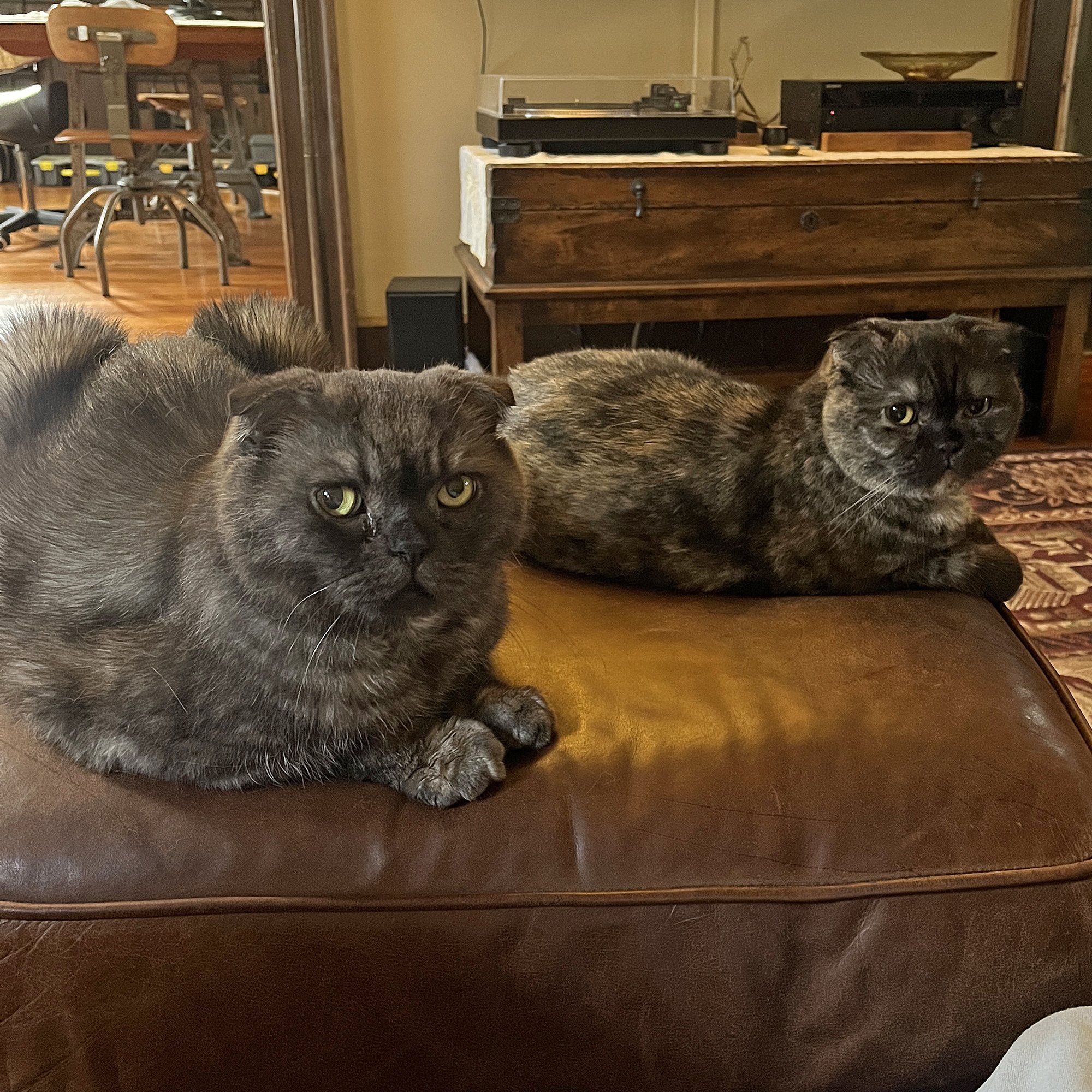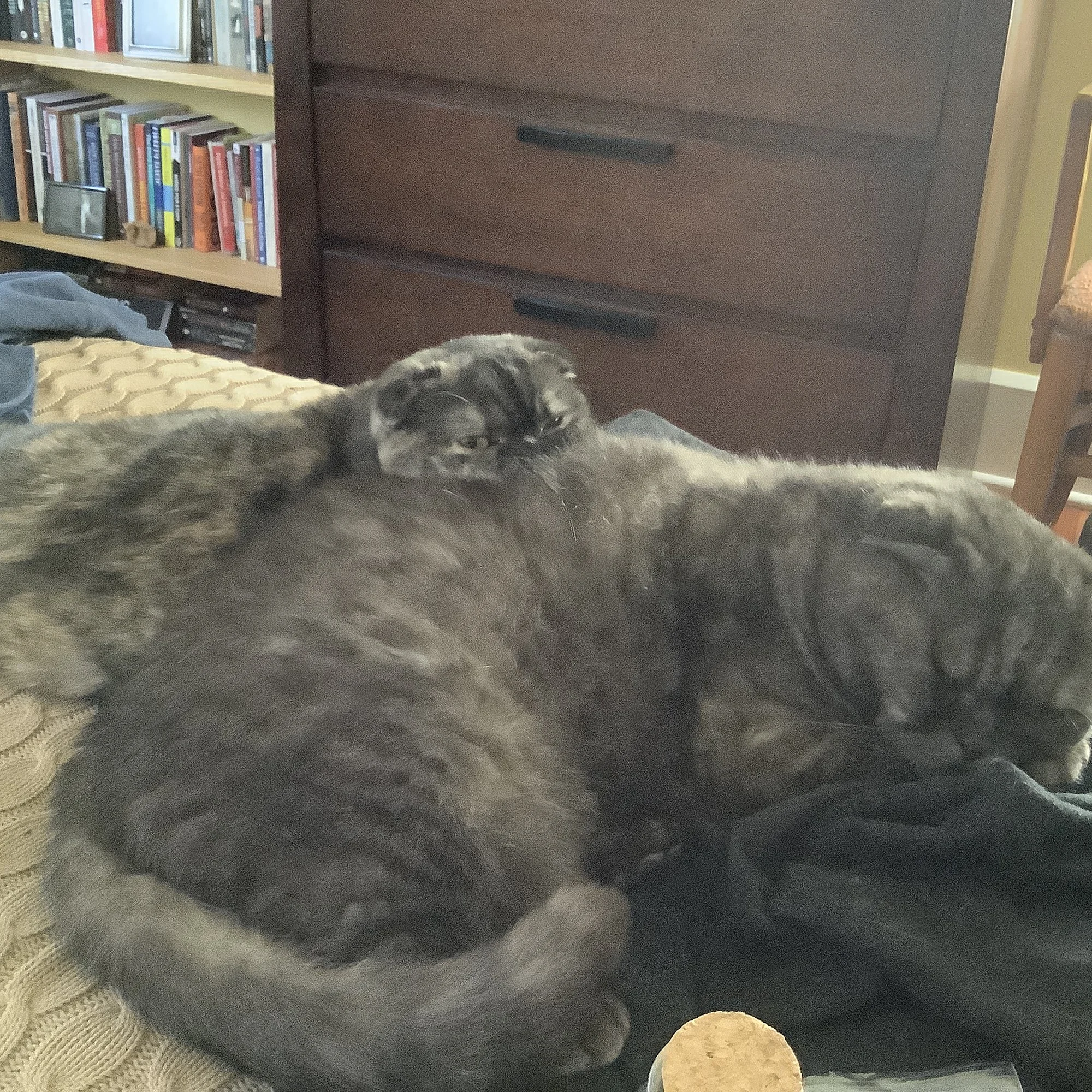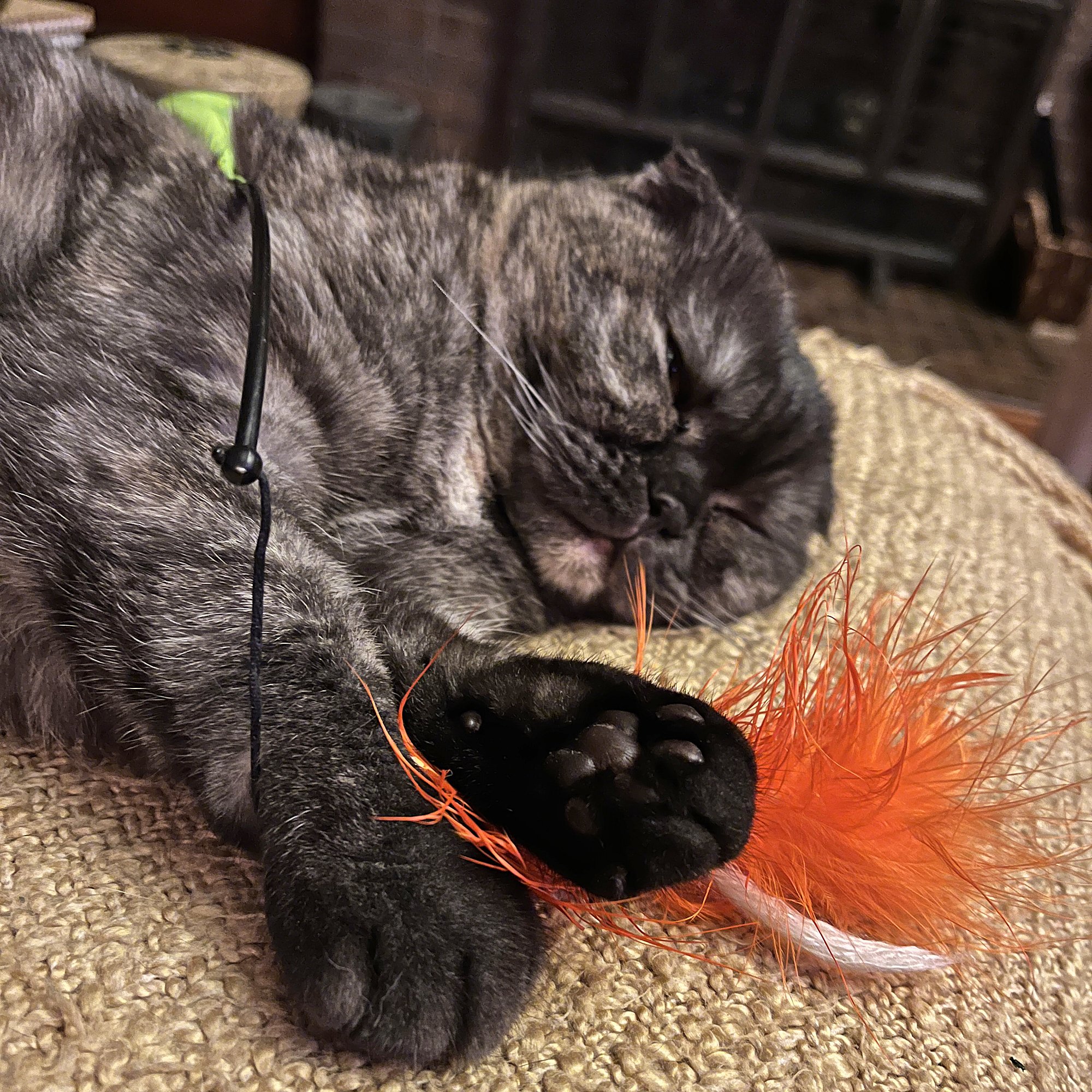Why Scottish Folds?
Our Scottish Folds (in order): Icky, Boodle, Pudge, Zeezo, Pooja & Binny. A ton of additional photos of all six follow the text. Enjoy!
***
If you've followed us for very long, you've probably noticed that we have three Scottish Folds—why so many of this breed? Short answer—because they're wonderful cats and we have specialized knowledge of caring for them. But how did we get there?
Way back in the late ‘90s, Michael adopted a 6-year-old Scottish Fold. Her family’s new baby was allergic to cats, so although they loved her, she had to go. He dubbed her Icky due to her especially atrocious breath (a common Fold characteristic) and they quickly became best buddies. She liked to lay on the curve of his guitar while he practiced, liked to hang out wherever he was, talked a lot, and preferred to be carried around vs. conveying herself from place to place. It was hard not to adore her.
When they added me and my cats (Farley & Salinger) to the mix, Icky and I buddied up as well.
If you’ve never had a Fold in your life, they’re a different breed—both for good and ill. They’re "doggish" cats. They’re exceptionally social, extremely trainable, quite conversational, and they love to be around their people all the time. That also means that they need more attention than the average cat—loads more. Fortunately for us, we both work from home. If we didn’t, I know we’d start to see behavior issues and depression from them.
I’ve had cats my whole life, and Scottish Folds are simply delightful cats.
But…
Most often they’re cross-bred with British Shorthairs, which means a thick coat, which looks gorgeous and is delightful to pet, but it also means frequent and necessary grooming. Hairballs can be rough for them.
They also then to have shorter muzzles, especially the females. This means more breathing issues and snoring, potentially infections. In addition, they tend toward having allergies, which means cleaning their eyes daily (train them early for this) and regularly checking the lower third of your walls for little sneeze marks. And prepare for surprise face-sneezes when they’re sleeping with you.
Short muzzles and closed ears can also result in frequent yeast infections in their ears. The more tightly closed their ears, the higher the chance of infection. Like all cats, they don't love ear cleaning, which if done improperly can be painful or even deafen them. But, if not treated, these infections can cause itching, burning, fur-loss, or even deafness.
Worst of all, if they’re bred wrong, Scottish Folds have some very serious genetic health issues, most notably polycystic kidney disease (PKD), hypertrophic cardiomyopathy (HPC), and osteochondrodysplasia—or the easier to pronounce Scottish Fold Disease (SFOCD). The latter was why Icky loved to be carried around instead of walking. She had terrible arthritis thanks to SFOCD, including big knots on her kitty wrists and ankles as well as mobility issues in her shoulders and hips. Still, she managed to get up and down stairs on her own until near the end of her life (she lived to 16).
All this means that if you choose to buy a Fold, insist on a breeder who does genetic testing and can show you the documentation. If you choose to adopt a Fold without genetic testing or adopt one from an unknown breeder, be prepared to deal with potential future health issues or a shortened lifespan.
We loved Icky so much that we found a breeder in Atlanta and added three Folds to our family over four years—Boodle, Pudge, and Zeezo. (We also lost Icky, Farley, and Sal over those years as well—we weren’t just cat-mad.) At the time, there was no such thing as affordable feline genetic testing, but we checked out our breeder extensively first. Still, they all had health issues. Pudge had thyroid problems that led to a stroke at 10-years-old. Boodle did better, living to 15 before she had a stroke. Zeezo has inflammatory bowel disease (IBD) that went undiagnosed for years despite us repeatedly complaining about his daily vomiting to various vets. He was 12 before we found a vet who accurately diagnosed him and put him on medicine (prednisone), but by then the disease was so advanced, he'll be medicated the rest of his life. He also has arthritis, though fortunately, there’s a new medication developed specifically to help cats with arthritis pain. Unfortunately, he has to go into the vet for a monthly shot.
Overall, they’re sickly cats. As I'm a sickly human, it works out.
After Pudge’s stroke at 10-years-old, Michael and I decided we weren’t going to buy another Fold. However, by that time, we were uniquely experienced to care for the breed—we know what health signs to look out for and we have a vet who is knowledgeable and proactive in treating them.
So, when Boodle died, we decided to look for a re-homing situations like Icky.
A breeder in North Carolina pointed us toward Pooja, whose breeder had put her in a "cat hospice" in Detroit when she could no longer care for her litters. Pooja lived there for months with a lot of old and sickly cats before we found her. She has some fear-centric behavioral issues around grooming and her poor little tail is kinked where it was accidentally caught in a screen door. She also deals with a lot of dominance issues and absolutely shrieks when she feels at all threatened—every time she and Binny play, it sounds like Pooja's being murdered. She’s still a cuddle muffin who like to have her head covered while she makes biscuits in my armpit every morning.
Binny’s story is much more dramatic, lengthy, and sad. I won't share the whole story because it involves other people's private health business. We decided to look for another younger Fold when Pooja was two-years-old. Zeezo wasn’t much of a playmate for her (mostly he hissed and turned away when she tried to play), so I wanted to find someone who she could romp with.
We found Binny through adoptapet.com. He was only three-months-old, but his new family had a sudden move due to a job change—and their new home wouldn’t accommodate three cats. We reached out to them and went through the usual precautions of making sure the cat was real and the seller was legitimate (always do this). The seller wanted the full price he’d paid from the breeder, so we said to let us know things changed and moved on with our search. As the days and weeks passed, the seller's price went down and down and down, and I kept checking in. Finally, the week before they were to move, the seller texted me to say they were putting Binny down the following Monday. I freaked out. They said their family believed putting him to sleep was kinder than surrendering him to a shelter. In addition, one family member was having IVF treatments with little luck (and a lot of side effects), and her spiritual advisor (of questionable credibility) had suggested the new kitten was causing the lack of conception. Eventually, Michael convinced them that we were a preferable alternative to paying to put Binny to sleep and we sped up to Chicago the Sunday before his deadly vet appointment.
They're both wonderful cats, but like the others, they have health problems that require constant attention. Pooja has a bad eye that weeps constantly—treatment has eased the issue, but she still requires daily eye cleaning. She's far better behaved for eye cleanings than simple brushing. She also has some bowel issues related to periodic bacterial overgrown, but I'll spare you that description. Her tail is stubby and stiff and it bends backwards easily, which could indicate SFOCD or could be a byproduct of being a tortie Fold—Pudge had the same type of tail and she was a torite Fold. To date, Pooja hasn't shown any other signs, but we watch her closely and ensure that she gets lots of exercise to keep her muscles strong.
Binny quite obviously has SFOCD—you can see it in every photo of him splayed out with his belly up. His hips are very loose, which tells us he'll have arthritis in the future like Icky. It also means that he frequently pees all over his back-side fur and feet. But Folds are such good and trainable cats that he literally comes and tells us whenever he's made a mess of himself and lets us clean him up. Seriously, he comes and paws at us until we wipe his backside.
They're wonderful cats and I highly recommend them to anyone who wants a full-time buddy. They will help with everything. With patience and gentle training (treats and redirection work best), they can learn just about anything. You've undoubtedly noticed them sticking their adorable noses in our product photos here and there. Just be sure you have the time to dedicate to them. Like dogs, they need to be engaged in daily exercise to keep their muscles strong—especially if you suspect SFOCD—and they need lots of positive attention, individual acknowledgement, and physical affection or they'll turn inward and be depressed and sulky. In return, they'll be the greatest love muffins you can imagine. If you can meet their needs, they'll absolutely meet yours.
If you have any questions about Scottish Folds—locating, adopting, health issues, or anything else—don't hesitate to contact us. We're always happy to help!
As promised, additional cat photos below, grouped in order by age—Icky, Boodle, Pudge, Zeezo, Pooja, Binny. Squidget also appears several times in the photos—she thought she was a Fold, but she was mistaken.






